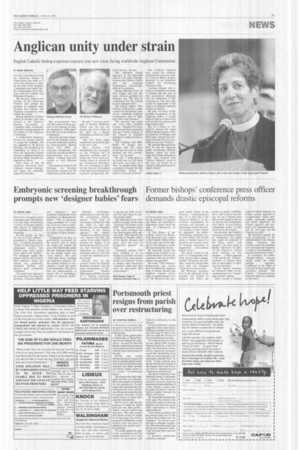Page 3, 23rd June 2006
Page 3

Report an error
Noticed an error on this page?If you've noticed an error in this article please click here to report it.
Tags
Share
Related articles
Anglican-catholic Dialogue In Ruins
Vatican Warns Williams Of Collapse Of Ecumenism
Pope To Meet Williams Before Crisis Summit
Bishops Urge Catholics To Attend Anglican Eucharists
Dr Williams Will Travel To Vatican In The Autumn
Anglican unity under strain
English Catholic bishop expresses concern over new crisis facing worldwide Anglican Communion
BY MARK GREAVES
A WOMAN was chosen to lead the American branch of Anglicanism this week in a move that threatens to shatter the unity of the Anglican Communion and cause a further deterioration of its relations with the Catholic and Orthodox Churches.
The decision, made by the bishops of the Episcopal Church, will plunge the prospect of eventual unity between the Catholic and Anglican communions even further into doubt.
Bishop Katharine Jefferts Sehori of Nevada, who was elected at the Church's General Convention in Columbus, Ohio, on Sunday, is the first woman primate in the history of the Anglican communion.
A traditionalist American diocese has already refused to accept her authority and has appealed to Dr Rowan Williams, the Archbishop of Canterbury, to allow it to leave the Episcopal Church and join a different Anglican province. Other dioceses are expected to follow.
Only three of the 38 Anglican provinces have ordained women bishops, and many are staunchly opposed to the idea. But commentators have said that many of those present at the meeting in Ohio are prepared to "walk apart" from the rest of the Anglican Communion.
The crisis has been heightened by the bishops' refusal to accept traditional teaching on homosexuality. Bishop Schori told CNN, an American broadcaster, this week that she did not believe homosexuality was a sin, adding: "I believe that God creates us with different gifts."
The response issued by Dr Williams on Monday showed his concern over the implications of the decision.
He said: "I send my greetings to Bishop Katharine Schori and she has my prayers and good wishes as she takes up a deeply demanding position at a critical time.
"She will bring many intellectual and pastoral gifts to her new work.
"Her election will undoubtedly have an impact on the collegial life of Anglican primates and it brings into focus some continuing issues in several of our ecumenical dialogues. We are continuing to pray for the General Convention of the Episcopal Church as it confronts exceptionally dif
ficult choices," he said.
The defiantly liberal approach of the Episcopal Church will make dialogue between the Catholic Church and the Anglican Communion increasingly difficult to maintain.
Bishop Michael Evans of East Anglia said that the most obvious problem for dialogue was "the lack of communion for the Church to have dialogue with".
The bishop added: "The Catholic Church has a deep concern for the internal unity of the worldwide Anglican Communion, and we hope they find a way forward."
The decision was made one week after Cardinal Cormac Murphy-O'Connor said that genuine ecumenical dialogue would collapse if the Church of England decided to ordain women as bishops.
The Cardinal told BBC Radio 4's Sunday programme that the move would put the goal of unity between the two communions "out of reach".
He said: "I think there is no doubt that we will more and more now exist, as it were, in parallel rather than converging towards the full communion which we believe is the will of Christ." The Cardinal repeated very closely the concerns expressed the previous week by Cardinal Walter Kasper, president of the Pontifical Council for Promoting Christian Unity.
Cardinal Kasper told a Church of England assembly of bishops that the goal of true ecumenical dialogue was the restoration of full communion, but that this would be impossible if the Church of England ordained woman as bishops.
He said: "In terms of the possible recognition of the Anglican orders, it would lead not only to a short-lived cold but also to a serious and long-lasting chill."
But in a letter to The Catholic Herald this week Bishop Hugh Lindsay, bishop emeritus of Hexham and Newcastle, insisted that dialogue between the two communions was not "fruitless".
He said that although Pope Paul VI and the Anglican leader Archbishop Michael Ramsey aimed for unity when they began dialogue in 1966, they realised that "serious obstacles" stood in the way, yet looked for a "greater understanding and a deeper charity".
Letters: Page 11
blog comments powered by Disqus

















